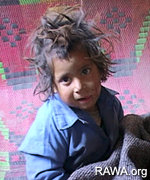IRIN News, May 11, 2007
Thousands of child labourers in eastern province deprived of education
According to Save the Children (Sweden), there are up to 5,000 child labourers working in brick factories in Nangarhar.
From dawn to dusk black smoke rises from the towering chimneys of brick-making factories in the Sorkhroad district of Afghanistan's eastern province of Nangarhar.

"Afghanistan has received 12 billion $ in aid but there aren't any signs of serious reconstruction. Our people have not benefited from the billions of reconstruction dollars due to theft by the warlords or misuse by NGOs. Even a fraction of this aid has not been used for the benefit and welfare of our people. Government corruption and fraud directs billions of dollars into the pockets of high-ranking officials. It is such a big shame that the government still cannot provide electricity, food and water for its people."
Zoya's Speech ( http://www.rawa.org/zoya_oct7-06.htm ), Oct.7, 2006
There are about 60 such factories in Sorkhroad which produce most of the red bricks used for construction in the densely populated Nangarhar province.
Seven-year-old Rahatullah works with his father and elder brother, Habibullah, aged 12, in a brick factory for over 12 hours a day.
"It is always vexing when my father wakes me at 4:00 am to go to work," the slim and deeply tanned boy told IRIN at a factory. "I feel constant pain in my back and legs. We have long working hours and sometimes I feel very sleepy."
Rahatullah and his brother have never been to school, but he says he has always wanted to study like other boys. "When I see boys and girls of my age who go to school, I really want to join them, but we are poor and I have to work," the young brick maker said.
Some 5,000 child labourers in Nangarhar
According to Save the Children (Sweden), there are up to 5,000 child labourers working in brick factories in Nangarhar.
Haneef Shinwary, an official for Save the Children in Nangarhar said: "Twenty to 25 families live in these factories and their children, along with their parents, work in harsh conditions."
Children face various risks at work and some of them sustain serious injuries such as broken bones, the children's protection body said.
Poverty
Poverty is seen as a major reason driving many parents to let their young children work.
For Abdul Mohammed who works at a factory with his two daughters, Shano, 8, and Meeno, 10, it seems impossible to feed his eight-member family without his daughters' support.
"Even if I work 20 hours, I will only earn 200 Afghani [about US $4] which does not meet our basic needs. So I have no other option but to ask my daughters to give me a hand. I feel very uncomfortable about this," Mohammed said.
UN convention
The country is a signatory to the UN Convention on Children's Rights and other treaties which prohibit child labour, but institutional mechanisms which should translate formal commitments into appropriate action are absent, Afghanistan's Independent Human Rights Commission (AIHRC) said.
"There is also widespread ignorance about child rights which is exacerbated by the lack of law enforcing capacity, thus child labour has been interwoven into the very fabric of our society," said Najibullah, a children's rights commissioner at AIHRC.
In an effort to mitigate the suffering of these child labourers the UN Children's Fund (UNICEF) is thinking of establishing community schools near brick factories in Sorkhroad.
"Obviously UNICEF alone cannot solve all the economic and social problems of parents whose children work at brick factories, but we have plans to build community schools in Sorkhroad and other areas where access to education will be made easier for these children," said Saeed Mohammed Saeed, UNICEF office director in Nangarhar.
Characters Count: 4720

 (
(